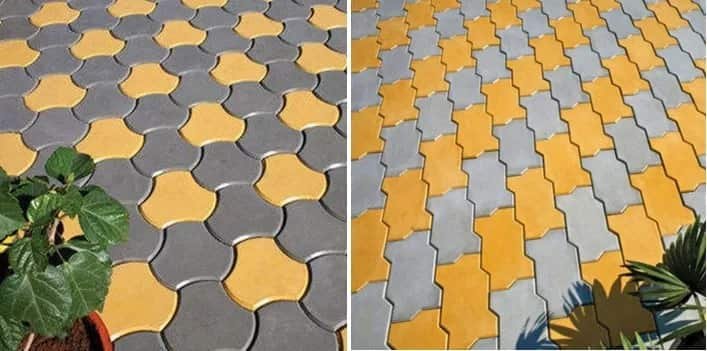Paving blocks are a popular and versatile option for creating durable and aesthetically pleasing outdoor surfaces. Whether you are looking to create a patio, a driveway, a garden path, or a retaining wall, paving blocks offer a range of benefits that make them an ideal choice for many homeowners and landscapers.
In this article, we will discuss some of the key benefits of paving blocks, as well as some important factors to consider when choosing and installing them.
Benefits of Paving Blocks:
Durability:
One of the primary benefits of paving blocks is their durability. Paving blocks are made from strong, high-quality materials that are designed to withstand heavy foot traffic, vehicular traffic, and exposure to the elements. Unlike other paving materials, such as concrete or asphalt, paving blocks are less likely to crack, warp, or fade over time, making them a long-lasting and cost-effective option for outdoor surfaces.
Versatility:
Paving blocks come in a wide range of colors, shapes, and sizes, making them a highly versatile option for outdoor design. Whether you are looking to create a classic, traditional look or a modern, contemporary feel, paving blocks can be customized to suit your individual style and preferences.
Low Maintenance:
Another major benefit of paving blocks is their low maintenance requirements. Unlike other paving materials, such as concrete or asphalt, paving blocks do not require regular sealing or other treatments to maintain their appearance and functionality. In most cases, a simple periodic cleaning is all that is needed to keep paving blocks looking their best.
Environmentally Friendly:
Paving blocks are an environmentally friendly choice for outdoor surfaces. Because they are made from natural materials, such as clay, concrete, or natural stone, paving blocks are highly sustainable and can be recycled or repurposed at the end of their useful life.
Factors to Consider When Choosing Paving Blocks:
Material:
The material of the paving blocks is an important consideration when choosing the right product for your outdoor surface. Clay, concrete, and natural stone are the most common materials used for paving blocks, each offering their own unique benefits and drawbacks.
Concrete:
Concrete paving blocks are a popular choice due to their affordability and versatility. They come in a wide range of colors and shapes and are highly durable. However, they may be more prone to cracking or chipping over time.
Natural Stone:
Natural stone paving blocks offer a unique, natural look and are highly durable. However, they can be more expensive than other materials and may require special care and maintenance to prevent staining or erosion.
Size and Shape:
The size and shape of the paving blocks can have a significant impact on the overall look and feel of your outdoor surface. Rectangular or square blocks are a common choice for driveways and patios, while smaller, irregularly shaped blocks may be better suited for garden paths or retaining walls.
Color:
The color of the paving blocks can also be customized to suit your individual preferences and design style. Earthy, natural tones are a popular choice for outdoor surfaces, but bold, vibrant colors can also add a unique and eye-catching element to your design.
Installation:
Proper installation is critical to the durability and functionality of your paving blocks. It is important to work with a reputable and experienced installer who can ensure that the blocks are properly leveled and secured for long-term use.
Conclusion:
Paving blocks are a versatile and durable option for creating beautiful and functional outdoor surfaces. Whether you are looking to create a new patio, driveway, garden path, or retaining wall, paving blocks offer a range of benefits that make them an ideal choice for many homeowners and landscapers. By considering the material, size and shape, color, and installation process, you can choose the right paving blocks for your needs and create a long-lasting, beautiful outdoor surface.
When it comes to installation, it is important to hire a professional who has experience with paving blocks. Proper installation is critical to the durability and longevity of the blocks. The installation process typically involves digging a trench, filling it with gravel and sand, and then laying the paving blocks in a specific pattern. Once the blocks are in place, the installer will add more sand or gravel to fill in any gaps and then compact the surface to ensure that the blocks are secure.
In addition to hiring a professional installer, there are also some important maintenance considerations to keep in mind to ensure that your paving blocks continue to look and function their best. Regular cleaning is essential to prevent the buildup of dirt, debris, and organic matter that can stain or discolor the blocks over time. A pressure washer can be used to remove stubborn stains, but care should be taken to avoid damaging the surface of the blocks.
If your paving blocks do become damaged or worn over time, they can typically be replaced or repaired relatively easily. This is one of the advantages of using paving blocks over other materials, such as concrete or asphalt, which can be more difficult and costly to repair.
Overall, paving blocks are a versatile and durable option for creating beautiful and functional outdoor surfaces. By considering the material, size and shape, color, and installation process, you can choose the right paving blocks for your needs and create a long-lasting, low-maintenance outdoor surface that adds value and beauty to your home or property.




